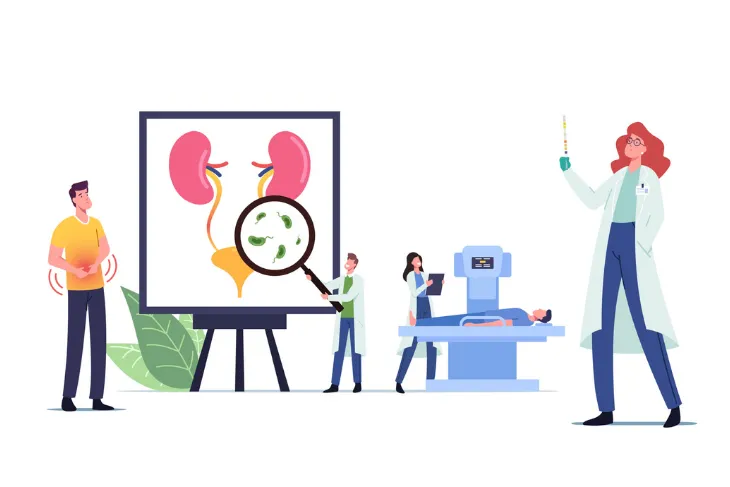The symptoms of a urinary tract infection (UTI) are not pleasant and in some cases, they can be quite painful. The discomfort can even disrupt your daily activities.
If you want to prevent a UTI from occurring in the first place, it’s important to understand the causes. And learning the symptoms can also help you recognize when you do have one so you can get the treatment you need. Here is everything you should know about a UTI.
What Is a UTI?
Cleveland clinic explains, “a urinary tract infection (UTI) is an infection of the urinary system.” It can happen anywhere in your urinary tract including your kidneys, ureters, bladder, and urethra. That said, most UTIs involve the bladder and urethra in the lower tract.
While UTIs can be unpleasant, they are very common. In fact, 1 out of 5 women will experience a UTI in their lifetime. UTIs may be common in women, but they can also happen to anyone including men, older adults, and even children.
Common Symptoms of a UTI
It’s important to note, a UTI won’t always cause signs and symptoms, however, one of the most common symptoms of a UTI is a strong, persistent urge to urinate. You may also experience a burning sensation or pain when urinating.
Other common symptoms of a UTI include cloudy, bloody, or strong-smelling urine. You may also only pass small amounts of urine at a time. Finally, some individuals may also experience nausea, vomiting, muscle aches, and abdominal pain.
Do Symptoms of a UTI Differ for Men and Women?
For the most part, men and women will experience similar symptoms. Symptoms of an upper tract infection are especially similar in both men and women.
Men who experience a lower tract urinary infection may also experience rectal pain. Further, women who experience a lower tract urinary infection may also experience pelvic pain in addition to the other common symptoms.
Common Causes of a UTI
UTIs are caused by bacteria that enter the urethra and bladder. This can cause an infection and inflammation. Medical News Today says, “the vast majority of urinary tract infections (UTIs) are caused by the bacterium Escherichia coli (E. coli), usually found in the digestive system.”
Even though the infection usually happens in the bladder and urethra, it can also travel to the ureters and cause an infection in your kidneys. Keep in mind, the infection is given a different name depending on where it occurs. For example, a bladder infection is called cystitis, a urethra infection is called urethritis, and a kidney infection is called pyelonephritis.
Diagnosing a UTI
If you think you’re experiencing the symptoms of a UTI, then book an appointment with your doctor. Your doctor will be able to diagnose a UTI by asking about your symptoms and by taking a urine sample. Medical News Today says the urine sample will be assessed for the presence of white blood cells, red blood cells, and bacteria.
Further, if you experience recurrent UTIs, your doctor may require further testing to determine if anatomical or functional issues are to blame. Some of the tests they may require are diagnostic imaging tests such as an ultrasound, CT, MRI, or X-ray. They may also require urodynamics or a cystoscopy.
UTI Treatment
The good news is, treating a UTI is fairly straightforward. That said, the treatment will depend on the cause. If the UTI is caused by bacteria then your doctor will likely prescribe antibiotics to help fight the infection.
In contrast, if the UTI is caused by viruses or fungi then the UTI will likely be treated with medications called antivirals. Your doctor will be able to determine the best treatment for your situation.
At-Home Remedies for a UTI
While antibiotics will help clear the infection, there are some natural ways to soothe a UTI too. These home remedies may also help reduce the risk of recurrence.
First, you’ll want to avoid caffeine and alcohol as these can worsen the UTI symptoms. You may find relief from a heating pad or by taking a warm bath. It’s also important to drink plenty of water to help flush out the bacteria. Finally, other foods and drinks that may help soothe a UTI include cranberry juice, garlic, yogurt, and foods that are packed with vitamin C.
Possible Risk Factors
Anyone can get a UTI but some risk factors can increase your chances of developing one. Some of these include diabetes, poor personal hygiene, kidney stones, menopause, pregnancy, and more. Women are also more likely than men to develop UTIs based on the anatomy of their urinary tract anatomy.
In most cases, UTIs are not serious. However, some can lead to serious problems, especially upper UTIs, notes Medical News Today. If you have a long-lasting kidney infection, it may cause permanent damage. Some cases can even be life-threatening, especially if bacteria enter the bloodstream.
When to See a Doctor
If you develop symptoms of a UTI, you should contact your doctor. You should also see your doctor if your symptoms are severe or seem to be getting worse.
Further, if you’re experiencing symptoms of an upper UTI such as fever, pain in your sides or back, chills, or restlessness, then make sure you contact your doctor right away. Finally, if your symptoms don’t improve after treatment make sure you return to your doctor. They’ll be able to determine if there is a more serious underlying cause.












